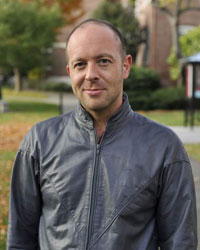
ANDY DRACHENBERG: Why is The Glass Menagerie a project that you wanted to work on?
JOHN TIFFANY: The Glass Menagerie is probably my favorite play. Ever since I first read it at Glasgow University back in the 1990’s, it’s connected quite deeply with me. The story itself is fueled by such guilt, passion and power from Tennessee Williams that it really grabbed me. Also the form of the play, in that it’s a memory play and it’s inherently theatrical, I found very exhilarating.
AD: When casting the roles, what were the qualities these actors had that gained your interest?
JT: Well number one is always that they’re great actors that you would be excited by seeing them in these roles. I think sometimes people think that we cast the actors that are those characters, and actually that’s not what really interests me. I’m interested in casting actors who I think will have an interesting approach to these characters. Indeed, that’s certainly turned out to be the case with these four. Cherry, Zach, Brian and Celia have just refreshed, re-energized, and remade those characters for me through the rehearsal process. And it’s been a joy.
AD: What is your favorite line in The Glass Menagerie?
JT: It changes, but I’m always really stunned by, “Nowadays the world is lit by lightning!” in that last monologue of Tom’s which he says just before the very last line: “Blow out your candles, Laura.” I mean, there’s some beautiful poetry running through it. Throughout the beautiful speech when Tom’s talking about the music coming from Paradise dance hall, he says, “All the world was waiting for bombardments!” There’s a great pregnant energy in the play. But my favorite line changes.
AD: When you first tackled this play, what was your first entry into it as the director?
JT: The first entry point for me is Tom’s opening monologue – which connects with the introduction to the play itself. In the play text, Tennessee Williams writes about what he calls “plastic theatre.” That really struck me back as a university student in the 1990’s and has been really interesting to revisit. I read the introduction again and what Williams calls “plastic theatre,” and how he’s got no troak with naturalism and realism. He wanted to use all the tools we have at our disposal- design, lighting, music, movement, etc. – to create a holistic and transformative experience for the audience. Going back to read that, I was struck by how much that’s really defined my own ambitions as a theatre director. So, my entry to The Glass Menageriewas really the introduction to the play that goes into Tom’s monologue, where he says “The play is memory. Being a memory play, it is dimly lighted, it is sentimental, it is not realistic. In memory everything seems to happen to music. That explains the fiddle in the wings.” Tennessee tells you how to stage the play and how to direct it. I find that really exciting. I feel like I’ve got a dialogue going with Tennessee Williams even though he’s not here to work with us.
AD: What are you hoping audiences experience at the show?
JT: A great night at the theatre. I mean, the play is one that’s very well known. I’ve been lucky enough to get these brilliant four actors to come and work with me on it. I want the audience to experience a pure telling of the play. I hope they feel Tennessee Williams’s Glass Menagerie come through and that’s what they leave with. Audiences will all bring their own personal energies and stories and situations that day. One of the very powerful things about the play is it’s about family- and we’ve all got them. Everyone will bring their own experience of family and their own current situation of that, so they’ll all leave with different things. That’s the joy of theatre. I want audiences to have a good night and be able to connect with the play as fully as possible.
JOHN TIFFANY (Director). Broadway: Macbeth, Once (Tony Award). A.R.T.: The Glass Menagerie. National Theatre of Scotland: Let The Right One In, Macbeth, Enquirer, Peter Pan, The House of Bernarda Alba, Transform Caithness: Hunter, Be Near Me, Nobody Will Ever Forgive Us, The Bacchae, Black Watch (Olivier Award, Critics’ Circle Award, South Bank Show Award), Elizabeth Gordon Quinn, Home: Glasgow. Other work includes: Jerusalem, West Yorkshire Playhouse; Las Chicas del Tres y Media Floppies, Granero Theatre, Mexico City; If Destroyed True, Mercury Fur, The Straits, Helmet, Paines Plough; Gagarin Way, Abandonment, Among Unbroken Hearts, Perfect Days, Passing Places, Traverse, Edinburgh. John Tiffany studied Classics and Theatre Studies at the University of Glasgow. He was Literary Director at the Traverse Theatre, Associate Director at Paines Plough and founding Associate Director for the National Theatre of Scotland. In 2010/11 John was a Radcliffe Institute fellow at Harvard University. He is an Associate Director at the Royal Court.